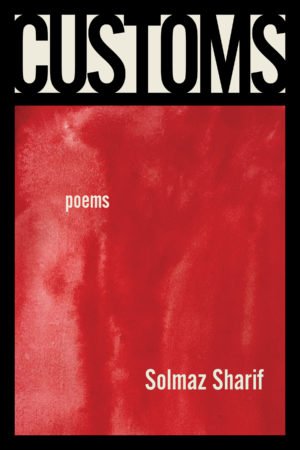Customs
by Solmaz Sharif
reviewed by Christos Kalli
It’s hard to think of an English word as politically charged as “customs.” Deriving from Anglo-Norman and Old French, it may refer to a collective mode of behavior, a tradition laid down by the law, the governmental body controlling the flow of goods into and out of a country, or the area at a border crossing where incoming goods are inspected. With its focus on assimilation, exile, and dispossession, Solmaz Sharif’s second poetry collection, Customs, brings together these disparate definitions in poems that push against poetic custom.
In her debut collection, Look (2016), Sharif established herself as a poet deeply invested, as she said during a reading at the Radcliffe Institute, in “how violence against bodies is premeditated in violence against language itself.” In Customs, she pursues this question further. The opening poem of the collection, “America”—its entry-point, if you will—frames this question in the context of the nation. American poets from Herman Melville and Walt Whitman to Gertrude Stein and Allen Ginsberg have long resorted to the same monolexical title in their poetry: America. Sharif dispenses with the maternal metaphor of America prevalent in the nineteenth century, drawing instead on the linguistic fragmentation of modernism, specifically the political critique of Harlem Renaissance writers like Claude McKay and of her own contemporaries Richard Blanco and Aria Aber. Sharif indicts America in this bare-bones poem:
I had
to. I
learned it.
It was
if. If
was nice.
I said
sure. One
more thing.
In a single stanza, broken into two-word lines and divided into three-word sentences, the most economical poem of the book relies on a few seemingly unproductive words like “nice” (a word creative-writing students are told to avoid at all costs) to paint a portrait of America. This configuration allows Sharif to portray America how she sees it—as a place that infantilizes immigrants, seeing them as capable of speaking only broken, simple English, as a place that permits them to speak only three words a time. Yet Sharif opens up the linguistically constrictive space of “America” by loading these facile-seeming words with generative meaning. The conjunction “if,” used here as a makeshift noun, denotes both the possibilities America affords (“nice”) and the conditions it imposes (“One more thing”).
Other poems attempt to write back to the powers that be. In “He, Too”—a poem, alongside “Visa” and “Without Which,” about border surveillance—Sharif encounters an immigration officer at an airport who, after inquiring about her occupation, tells her “I hate poetry [ … ] / I only like writing / where you can make an argument.” Sharif responds:
I don’t tell him
he will be in a poem
where the argument will beanti-American.
I place him here, puffy,
pink, ringed in plexi, pleasedwith his own wit
and spittle. Saving the argument
I am let inI am let in until
Confronted with the interrogative power of the agent and the nation he stands for—“Anything he asks, I must answer”—Sharif turns to writing, as a means of regaining control of her own narrative and of combating limited views of poetry. Despite the symbolic plexiglass protecting the agent, she places him in the poem—a verb that invokes the power she wields as author and as someone laying claim to America. But this reclamation is only partial. The poem is cut short, ending with the conjunction-preposition “until” instead of a full-stop, which might provide closure. Sharif writes she is “let in until,” hinting at the threat of deportation and the existential until-ness she must live with.
In her poems, Sharif takes economy of style to an extreme—but she does more than just that. For her, disruption and negation are also powerful tools of communication. This is the case even in her longer poems. “Without Which” and “The Otherwise” stretch twenty-two pages, taking up the second and third sections of the book, respectively. In “The Otherwise,” after touching on her mother’s school years in Iran, life in Istanbul, the “[a]lluring otherwise life” and the customs that were left behind, she returns to the void on the other side of language:
What awaits us on the other side
of alphabet,
scrawlserrated, all slit,
all hole,red with scream,
I do not know.The knowing is the dullest part of all.
In poems like this, Sharif places readers in the in-between position she occupies. She forces us to live with the uncertainty of not understanding things fully, to recognize that “knowing is the dullest part of all.” Sharif’s ruminations on language in Customs—and how to keep it alive and potent—cement her position as one of the most thoughtful poets working today.
Published on April 5, 2022

